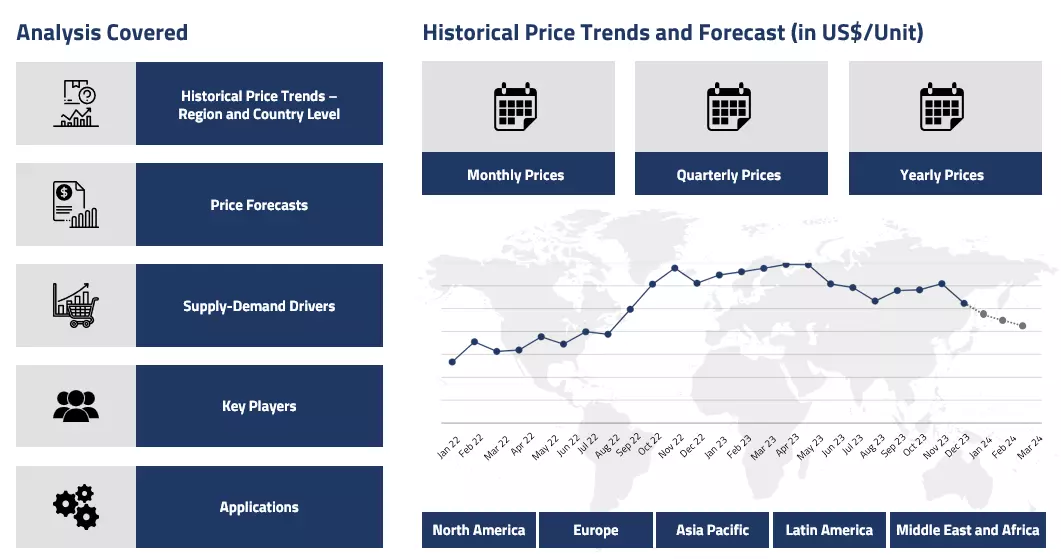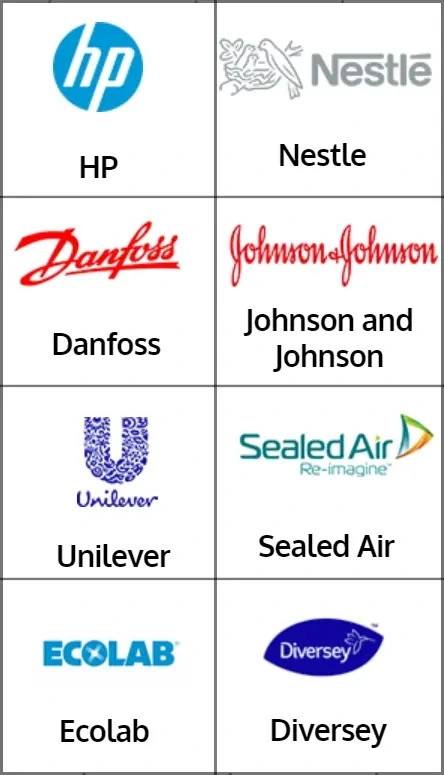Product
Oleic Acid Price Trend and Forecast
Oleic Acid Price Trend and Forecast
Oleic Acid Regional Price Overview
Get the latest insights on price movement and trend analysis of Oleic Acid in different regions across the world (Asia, Europe, North America, Latin America, and the Middle East & Africa).
Oleic Acid Price Trend for the Q4 of 2024
Asia
In Q4’24, the price of Oleic Acid in Asia saw an upward trend, largely influenced by rising raw material costs, particularly palm oil. Palm oil, a key feedstock for oleochemical production, experienced significant price hikes, especially in Malaysia and Indonesia, which in turn pushed up the cost of Oleic Acid. The region also saw a surge in imports of finished oleochemicals like Oleic Acid, primarily from countries like Malaysia and Thailand, which further pressured local producers.
Oleic Acid Price Chart

Please Login or Subscribe to Access the Oleic Acid Price Chart Data
Despite the import surge, demand from industries like cosmetics, food, and manufacturing remained steady. However, the increased competition from imported Oleic Acid, often priced lower due to minimal import duties, made it difficult for local manufacturers to maintain competitive pricing. Additionally, the Indian market, being one of the largest consumers in the region, felt the impact most acutely due to higher import volumes and shifting market dynamics.
Europe
In Europe, the price of Oleic Acid also saw upward pressure during Q4’24. The primary factor driving this increase was the rise in palm oil prices, which significantly affected the production costs of Oleic Acid. Europe faced challenges related to global supply chain disruptions, which made the procurement of palm oil more costly. As a result, Oleic Acid prices rose in line with the increased production costs.
Demand in Europe remained stable, particularly from the food and personal care sectors. However, the impact of higher raw material prices was felt across the supply chain, and manufacturers adjusted their pricing strategies accordingly. Despite some fluctuations in supply due to geopolitical issues, Oleic Acid demand in the region showed resilience, preventing any significant downturn in prices.
North America
In North America, Oleic Acid prices followed a similar upward trajectory in Q4’24. The surge in palm oil prices in global markets also contributed to rising Oleic Acid prices in the U.S. market. The demand from industries such as food processing, agriculture, and personal care products remained relatively stable. However, the increased competition from imports, especially from Southeast Asia, compounded the pressure on local producers. The higher cost of palm oil, along with rising transportation and logistics costs, further strained profit margins for domestic Oleic Acid manufacturers. Despite these challenges, demand from key sectors like agriculture, where Oleic Acid is used as an emulsifier and lubricant, continued to sustain the market.
Analyst Insight
According to Procurement Resource, Oleic Acid prices are expected to remain elevated due to sustained high palm oil prices and steady demand from downstream industries. Any disruptions in palm oil supply or further increases in raw material costs could lead to continued price pressures in the market.
Oleic Acid Price Trend for the Q3 of 2024
Asia
During the third quarter of 2024, the Asian oleic acid market experienced an upward price trajectory. This trend was primarily driven by supply constraints coupled with high demand from downstream sectors such as personal care, lubricants, and food industries. The Malaysian market saw a steady increase in prices throughout the quarter.
July started with relatively lower prices, but as demand from the personal care sector rose, so did the prices. August witnessed further price hikes, mainly due to increased demand from the food industry and limited availability of palm oil, a key raw material. The quarter concluded with peak prices in September, exacerbated by production issues in Indonesian facilities, further tightening the supply.
Europe
The European oleic acid market mirrored the Asian trend, showing a consistent price increase throughout Q3 2024. The primary factors contributing to this upward movement were strong demand from downstream industries, particularly the cosmetics and biodiesel sectors. Additionally, the implementation of the European Union Deforestation Regulation (EUDR) significantly impacted imports, leading to supply tightness in the region. As the quarter progressed, the biodiesel sector's demand intensified, pushing prices higher.
North America
North America's oleic acid market aligned with global trends, demonstrating an overall upward price movement during Q3 2024. The market was characterized by supply constraints and high demand from downstream sectors. The quarter began with steady demand, primarily driven by the personal care sector. As it progressed, the lubricants industry's increased requirements, which combined with logistical challenges impacted the price trend.
Analyst Insight
According to Procurement Resource, the prices of Oleic Acid will continue their upward trajectory in the coming months given the persistent strong demand coupled with ongoing supply constraints.
Oleic Acid Price Trend for the Q2 of 2024
Asia
In Malaysia and Indonesia, the largest producers of oleic acid, prices began climbing steadily during the mid-phase of the second quarter. This rise was primarily due to increasing domestic and international demand, which saw traders actively purchasing at higher prices. The oleochemical sector's preference for eco-friendly alternatives to petroleum-based products intensified the demand for oleic acid, leading to a supply-demand imbalance. Additionally, limited availability and moderate inventory levels in these regions further supported an uptrend in the prices.
The rising production costs, spurred by higher energy expenses amid global demand uncertainties, contributed to the price increases. The Malaysian palm oil market, a critical raw material source for oleic acid, also saw steady price rises, exerting a positive influence on the market. Further, factors such as increasing regional and international demand and palm oil's comparative advantage over other edible oils drove this market momentum. Despite significant growth in Malaysia's palm oil sector, with a notable rise in production and exports, the surge in demand outpaced this expansion, depleting inventories and supporting the bullish market sentiment.
Europe
The major importing regions for oleic acid, such as European countries, saw price surges in response to the upward trends in their demand dynamics of the commodity. However, the escalating costs of shipping compounded these price increases, disrupting purchasing plans and causing financial strain for both customers and suppliers.
The global shipping industry faced significant challenges, including a shortage of containers in China exacerbated by geopolitical tensions and logistical imbalances. The vessels rerouted from Houthi attacks in the Red Sea worsened container shortages, leading to delays from offloading at alternative ports, lowering the availability of the commodity in the market and giving a boost to its pricing patterns.
North America
North America, like European countries, depends on overseas imports to cater to its domestic demand for oleic acid. During the second quarter of 2024, the supply chain bottlenecks, such as drought conditions in the Panama Canal, reduced vessel traffic, declined the import capacity of the region and drove up transportation costs. These factors collectively impacted Oleic Acid prices, leading to soaring freight rates and extended lead times. Further, the inclining demand for the product in domestic markets and insufficient availability widened the supply-demand gap of the market, giving room to traders to increase their pricing quotations of oleic acid.
Analyst Insight
According to Procurement Resource, the price of Oleic Acid is expected to be driven by rising cost of raw materials in Malaysia and Indonesia and limited exports from there as struggling trading conditions present a bleak outlook for both producers and consumers.
Oleic Acid Price Trend for the Q1 of 2024
| Product | Category | Region | Price | Time Period |
| Oleic Acid | Chemicals | USA | 1582 USD/MT | March’24 |
| Oleic Acid | Chemicals | Europe | 1232 USD/MT | March’24 |
Stay updated with the latest Oleic Acid prices, historical data, and tailored regional analysis
Asia
In Asian countries, the oleic acid market saw a notable price surge, influenced by a number of favorable drivers of the market. The heightened manufacturing activities in oleic acid-producing countries were balanced by raised demand from both domestic and international markets. The traders also noticed that amid the improving landscape of the market, the inventories dried up at a quicker pace, further supporting the uptrend in the prices of oleic acid.
Another key contributor to this surge was the escalated prices of raw materials, particularly palm oil, with the domestic market experiencing an upward trend throughout the quarter. Anticipated decreases in Malaysian palm oil inventory data further fueled bullish sentiment in the palm oil market, consequently impacting oleic acid prices.
The Malaysian Palm Oil Board's announcement of unchanged export tax rates and an increased reference price for palm oil tariffs further influenced this upward trajectory. Additionally, fluctuations in the other edible oil market, influenced by South American weather changes, tightened the supply chains.
Europe
The geopolitical tensions, particularly in the Red Sea region, have significantly influenced oleic acid prices in many regions of Europe. The disruptions in other maritime routes, like the Suez Canal, further led to increased freight charges, causing challenges such as delivery delays and supply chain disruptions. The global market of oleic acid additionally faced repercussions from these disturbances, with freight prices experiencing an abrupt exponential rise and longer transit times around Africa.
Additionally, the devaluation of the Euro in January has added slight inflationary pressure, impacting market sentiment and pricing dynamics. Overall, the surge in oleic acid prices in the first quarter thus can be attributed to a combination of factors, including heightened manufacturing activities, fluctuations in raw material prices, geopolitical tensions affecting freight charges, and currency devaluation.
North America
During Q1 of 2024, the North American oleic acid market experienced a significant price surge driven by various factors. In the United States, rising temperatures fueled economic activity, while supply chain disruptions limited the growth of the oleic acid market. Additionally, rising tensions in West Asia raised concerns about shipping route closures, elevating shipping costs and adding to the challenges for importers, which were reliant on maritime transport. The decreased palm oil production in Indonesia, coupled with heightened demand, tightens supply dynamics and further supports an uptrend in the pricing patterns of oleic acid.
Analyst Insight
According to Procurement Resource, the price trend of Oleic Acid is expected to take on a bullish turn in major economies of the world. This uptrend is estimated to be fueled by the rising cost of production and limited availability of raw materials in the markets.
Oleic Acid Price Trend for the October - December of 2023
Asia
The fourth quarter of 2023 was filled with a number of challenges for the oleic acid price trend as they fluctuated throughout the quarter. The trend of oleic acid prices in Asian countries was based on the movement of the palm oil market. Indonesia and Malaysia are the two topmost suppliers of palm oil and other vegetable oils in the world.
These countries reported a loss in the year's harvest as the ill effects of the El-Nino phenomenon hit the agriculture sector of these countries badly and led to a decline in their harvest rates. Further, amid a rise in challenges presented by sustained inflation, consumers became conscious of their spending habits, which led to the stumbling of oleic acid prices in Q4 of 2023.
Europe
The adverse effects of climate change are to blame for Europe's record-high prices for oleic acid, as it brings with it hailstorms, floods, and droughts that lower the Mediterranean cultivated trees. Major producers like Greece, Spain, and Italy are facing lower yields of vegetable oils; in some locations, these reductions are as much as 45%. The issue got worse in 2023 during the hottest summer on record.
The rise in prices was caused by large firms as they halted the stocks and caused significant appreciation in the oleic acid price trend. The consumer sector was thus forced to acquire the product at this elevated cost, but this trend could not be sustained for long as the quarter approached its end, and the oleic acid prices tripped.
North America
The carried-forward inflation in the food and beverage industries continued to be a challenge for the oleic Acid traders in the last quarter of 2023. The rise in expensive imports from the Asian countries and loss of domestic produce to adverse climate conditions, resulted in the elevation in the oleic acid price trend.
However, the fluctuations in the market arose when the cost of crude oil hit a new low towards the end of the quarter, which was evidently visible in the slip of oleic acid price trend.
Analyst Insight
According to Procurement Resource, the price trend of Oleic Acid are estimated to be dependent on the harvest of raw materials and the effect of inflation on the food and beverage markets.
Oleic Acid Price Trend for the July - September of 2023
Asia
The third quarter of 2023 saw the oleic acid prices take a bearish turn despite significant inflation in the food sector. The oleic acid market was adversely affected by the slowing down of the industrial sector and the exponential rise in the level of inventories. The excessive production of oleic acid exerted negative pressure on traders and amid weak rates of procurement from the downstream industries, the oleic acid price trend moved downwards. The trader's profit margins also declined on account of stagnancy in the export chains as the weather conditions disrupted the supply cycles.
Europe
As seen in the Asia Pacific countries, the traders in European countries also struggled with the fall in the procurement rates of the downstream sector and, as a result, had to lower the asking price of oleic acid. In addition to this, the raw material industries also seemed to be affected by the pessimistic approach adopted by the consumers amid soaring inflation and exponentially rising rates of interest that, in turn, lowered the cost of production and, subsequently, the oleic acid price graph.
North America
The problem of oversupply of oleic acid persisted in North America, too, as the consumers failed to showcase the required interest in the oleic acid market. The oleic acid price trend declined on account of the feeble performance of the feedstock materials and the global recession in the palm oil sector. As the majority of the exporting nations were also affected by this period of recession, the domestic producers had no choice but to offer their produce at compromised rates, hurting the overall sentiments of the oleic acid market.
Analyst Insight
According to Procurement Resource, the price trend of Oleic Acid are expected to struggle with weak demand and a limited number of inquiries from the consumer sector.
Oleic Acid Price Trend for the First Half of 2023
Asia
Prices of oleic acid suffered from the dipping trend of cooking oil and other edible oil costs in the first quarter of 2023. The regulations imposed by Malaysia and the weakening of market sentiments were the major factors affecting the oleic acid price trend in the first quarter. In the second quarter, however, the price trend improved significantly with the rise in costs of raw palm and other edible oils. The hike was also backed by depletion in the level of inventories and a restricted supply of sunflower oil from Russia.
Europe
After a prolonged period of decline in the first quarter of 2023 due to the sliding cost of raw materials, the price trend of oleic acid surged in the second quarter of 2023. The first quarter witnessed low freight charges, high-functioning supply chains, and low demand from the downstream industries.
The second quarter, however, was supported by the surge in domestic demand and a steep decline in the level of inventories in the region. The supply chain disruptions were not able to keep up with the rising demand, and the increased number of inquiries from the international market further pushed the price trend of oleic acid in a positive direction.
North America
The trend of oleic acid in the North American region mirrored what was observed in the Asia Pacific and Europe. In the first quarter, the prices of oleic acid declined due to the decrease in the cost of raw materials and ample availability of oleic acid in the region. However, the trend inclined significantly in the second quarter. Prices of oleic acid in Q2 were supported by the improvement in demand dynamics from the downstream industries. The rising oscillations in the prices of feedstock and a positive outlook from the consumer segment drove the prices of oleic acid in the northward direction.
Analyst Insight
According to Procurement Resource, the price trend of oleic acid is expected to showcase an inclining trajectory as the global market conditions are recovering at a high pace.
Procurement Resource provides latest prices of Oleic Acid. Each price database is tied to a user-friendly graphing tool dating back to 2014, which provides a range of functionalities: configuration of price series over user defined time period; comparison of product movements across countries; customisation of price currencies and unit; extraction of price data as excel files to be used offline.
About Oleic Acid
Oleic acid belongs to the family of monosaturated fatty acids and is a central component of several vegetable and animal fats and oils such as olive oil, canola oil, and avocados. Oleic acid is essential for sustaining cellular function, assisting in energy storage, and boosting heart health by promoting cholesterol balance. At room temperature, its structure consists of a lengthy hydrocarbon chain with a single double bond, resulting in a fluid and stable fat molecule.
Oleic Acid Product Details
| Report Features | Details |
| Product Name | Oleic Acid |
| Chemical formula | C18H34O2 |
| Industrial Uses | Candle making, Food and additives, Personal care and cosmetics, Metal processing, Textile and leather processing, Plasticizers |
| HS Code | 38231200 |
| CAS Number | 112-80-1 |
| Molecular weight | 282.47 g/mol |
| Synonyms | (9Z)-Octadec-9-enoic acid |
| Supplier Database | Eastman Chemical Company, Berg + Schmidt GmbH & Co. KG, Emery Oleochemicals Sdn Bhd, Wilmar International Limited, White Group Public Co Ltd, Godrej Industries |
| Region/Countries Covered | Asia Pacific: China, India, Indonesia, Pakistan, Bangladesh, Japan, Philippines, Vietnam, Iran, Thailand, South Korea, Iraq, Saudi Arabia, Malaysia, Nepal, Taiwan, Sri Lanka, UAE, Israel, Hongkong, Singapore, Oman, Kuwait, Qatar, Australia, and New Zealand Europe: Germany, France, United Kingdom, Italy, Spain, Russia, Turkey, Netherlands, Poland, Sweden, Belgium, Austria, Ireland Switzerland, Norway, Denmark, Romania, Finland, Czech Republic, Portugal and Greece North America: United States and Canada Latin America: Brazil, Mexico, Argentina, Columbia, Chile, Ecuador, and Peru Africa: South Africa, Nigeria, Egypt, Algeria, Morocco |
| Currency | US$ (Data can also be provided in local currency) |
| Supplier Database Availability | Yes |
| Customization Scope | The report can be customized as per the requirements of the customer |
| Post-Sale Analyst Support | 360-degree analyst support after report delivery |
Note: Our supplier search experts can assist your procurement teams in compiling and validating a list of suppliers indicating they have products, services, and capabilities that meet your company's needs.
Oleic Acid Production Processes
- Oleic Acid Production from hydrolysis of Palm Kernel Oil
The palm kernel oil is converted to oleic acid via hydrolysis by lipase enzyme. The temperature and pressure of reaction conditions during the conversion is monitored regularly to get the highest degree of conversion as the enzymatic activity depends upon them.
Methodology
The displayed pricing data is derived through weighted average purchase price, including contract and spot transactions at the specified locations unless otherwise stated. The information provided comes from the compilation and processing of commercial data officially reported for each nation (i.e. government agencies, external trade bodies, and industry publications).
Assistance from Experts
Procurement Resource is a one-stop solution for businesses aiming at the best industry insights and market evaluation in the arena of procurement. Our team of market leaders covers all the facets of procurement strategies with its holistic industry reports, extensive production cost and pre-feasibility insights, and price trends dynamics impacting the cost trajectories of the plethora of products encompassing various industries. With the best analysis of the market trends and comprehensive consulting in light of the best strategic footstep, Procurement Resource got all that it takes.
Client's Satisfaction
Procurement Resource has made a mark for itself in terms of its rigorous assistance to its clientele. Our experienced panel of experts leave no stone unturned in ensuring the expertise at every step of our clients' strategic procurement journey. Our prompt assistance, prudential analysis, and pragmatic tactics considering the best procurement move for industries are all that sets us apart. We at Procurement Resource value our clients, which our clients vouch for.
Assured Quality
Expertise, judiciousness, and expedience are the crucial aspects of our modus operandi at Procurement Resource. Quality is non-negotiable, and we don't compromise on that. Our best-in-class solutions, elaborative consulting substantiated by exhaustive evaluation, and fool-proof reports have led us to come this far, making us the ‘numero uno' in the domain of procurement. Be it exclusive qualitative research or assiduous quantitative research methodologies, our high quality of work is what our clients swear by.
Table Of Contents
Our Clients

Get in Touch With Us

UNITED STATES
Phone:+1 307 363 1045

INDIA
Phone: +91 8850629517

UNITED KINGDOM
Phone: +44 7537 171117
Email: sales@procurementresource.com

